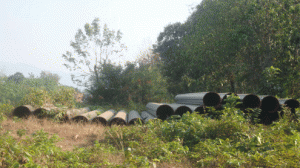Mudon Township residents have reported the destruction of their land due to new construction of the gas pipeline from Kanbauk to Myaingkalay. According to Mudon residents, the Burmese authorities began new construction due to the pipeline suffering repeated leaks and explosions...
Mudon Township residents have reported the destruction of their land due to new construction of the gas pipeline from Kanbauk to Myaingkalay.
 According to Mudon residents, the Burmese authorities began new construction due to the pipeline suffering repeated leaks and explosions.
According to Mudon residents, the Burmese authorities began new construction due to the pipeline suffering repeated leaks and explosions.
Construction began on March 3rd in order to connect the pipeline between Mudon and Thanphyuzayart. The Burmese authorities are using bulldozers to pave the route for the pipe and subsequently destroying land on which residents cultivate their rubber plantations.
Nai Tun, a resident in Mudon township and a victim who lost land, said, “I had four acres of land. I lost about 2 acres now. They did not compensate me.”
“This land is our legacy. It is our rice pot [livelihood]. We rely on it. We do not want to work in Thailand actually. But, now we have no option as our rice pot has been broken [livelihood is destroyed],” said Nai Tun.
According to the Human Rights Foundation of Monland (HURFOM) (http://rehmonnya.org), the Burmese government operated Myanmar Oil and Gas Enterprise (MOGE) began delivering large steel 30 inch pipes to villages along the Kanbauk to Myaing Kalay gas pipeline in southern Burma in early January 2011.
HURFOM coordinator, Nai Aue Mon, said, “They are not using the old routes in certain places where the former pipeline exists. They are digging a new route which is why the land was destroyed.”
The gas pipeline is 850 miles long and releases 100 million cubic feet daily which is transported to Ngante electricity station and Thaton electricty station in Mon state as well as to Rangoon.
Since 2009, leaks have occurred often in Kamarwet village, Mudon Township, Waekali village, Thanbyuzayart Township and Taung Wine, Moulmein, most often at the connection points from one town to another.
The pipe line has poor quality joints linking sections and Burmese government officials often blame explosions on the activities of armed insurgents.
“We have talked to the pipeline engineers and they told us that they are building a new one, mainly for security and protection for the people from explosions,” explained Nai Aue Mon.
The Kanbauk to Myaingkalay pipeline brings gas from the coast of the southern part of Burma in Tenasserim Divison to cement factories in Myaingkalay, Karen State. The pipeline has suffered repeated leaks and explosions since it was built in 2000. During the construction of the gas pipeline, land confiscation and forced labor by the Burmese authorities was reported often and committed against villagers who live near the gas pipeline.



